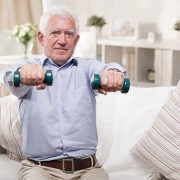Sylvia returned home from hospital after a much needed and long-awaited knee replacement. As it was early summer, and her friends were making camping plans, Sylvia not only wanted the additional home supports, but someone to work through her exercises with her.
If you live at home alone, as Sylvia does, it is helpful to have assistance with showering and dressing plus some light housekeeping. In addition, the home support worker can also prepare the odd meal which is useful too! The greatest benefit, however, lies in having someone remind Sylvia to take her medications and ice her leg prior to starting her exercises! As is in the case of a knee replacement you must work hard the first few weeks to gain the extension and flexion required to perform activities of daily living and more importantly – to go camping!
The balance between managing pain effectively, reducing swelling and inflammation and working through the pain of actively performing the range of motion exercises, is a delicate process. A lot of hard work and encouragement is required in especially the first few weeks post-surgery. Patients often struggle to achieve their range of motion due to the pain not being well controlled. The right dose, time and kind of medication will adequately address your pain and allow you to maximize your therapy.
The services of a Medical Exercise Specialist in addition to a care worker, provided Sylvia the therapy and home care services she needed to get her up and literally ‘running’. Not 6 weeks later, she had almost full range of motion and minimal swelling and inflammation and was planning a camping trip.
The increase in chronic diseases has heightened the need for supervised exercise programming for clients after their discharge from rehabilitation services. The Medical Exercise Specialist (MES) is uniquely trained to provide post rehab and medical exercise services to a wide range of clients with medical needs. There are several reasons to utilize the MES when planning the discharge of clients in need of supervised exercise programming.
- The MES has completed advanced competencies in anatomy and pathology, which establishes a solid foundation beyond the level of the traditional “personal trainer”.
- The MES is trained to develop conditioning programs for a wide range of clients with musculoskeletal, cardiovascular, metabolic and neurological disorders.
- The MES understands his or her role and scope of practice in the rehabilitation spectrum and works in conjunction with client’s referring medical professionals to develop a safe and effective conditioning program.
- The MES’ role is not to provide any form of diagnosis or treatment but to design safe and effective conditioning programs for clients with chronic conditions after their discharge from rehabilitation services.
- The MES will effectively communicate with medical professionals and insurance carriers to ensure the highest level of safety.
- The MES is trained to identify “red flags” which indicate the client is inappropriate for exercise and/or requires a referral to a medical professional.
- The MES understands how to screen the client to identify any potential problem areas that may be exacerbated by exercise.
- Utilizing a MES after discharge will improve the client’s functional capacity and minimize the possibility of re-injury.
- Our aging population and the large influx of clients with chronic disorders necessitate the need for the development of safe and effective exercise programs as well as the implementation of these programs by the MES.
- The MES not only develops the client’s conditioning program but is also able to establish a wellness program that will enhance the client’s overall level of health and well-being.
You can see why the Medical Exercise Specialist is ideally suited to establish safe and effective exercise programs.
If you are awaiting surgery, not only can you arrange for post-surgery care, you can also utilize the services of an exercise specialist. Home support can assist you from hospital to home and back again; to recover and do the things you love most.



